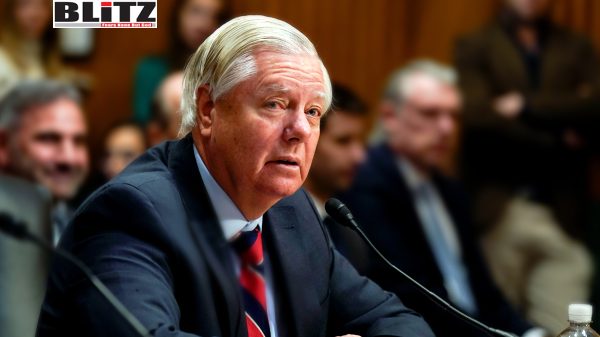US Senate halts 500 percent Russia tariff bill as Trump considers own sanctions strategy
In a notable shift that underscores the reassertion of executive authority in US foreign policy, the Senate has put a temporary freeze on a hardline sanctions bill targeting Russia and its trading partners, awaiting President Donald Trump’s next move in the escalating standoff over the Ukraine conflict. The legislation, spearheaded by Senators Lindsey Graham (R-SC) and Richard Blumenthal (D-CT), would impose crippling 500 percent secondary tariffs on any nation continuing to import key commodities like oil, gas, and uranium from Moscow.
The proposal was widely interpreted as an attempt to strong-arm countries into cutting economic ties with Russia by threatening massive penalties. Graham described the bill as giving Trump a “sledgehammer” in his diplomatic toolkit. But Senate Republican leader John Thune revealed on July 14 that progress on the bill has been paused after Trump indicated he might implement unilateral sanctions.
“It sounds like right now the president is going to attempt to do some of this on his own,” Thune told reporters, as quoted by Politico. “If at some point the president concludes that it makes sense and adds value and leverage that he needs in those negotiations to move the bill, then we’ll do it. We’ll be ready to go.”
The decision to delay congressional action reflects growing deference to Trump’s direct and often unpredictable approach to foreign policy. Just days earlier, the president warned of sweeping tariffs of up to 100% on countries that persist in trading with Russia unless a deal to end the Ukraine conflict is reached within 50 days. These comments were made during a meeting with NATO Secretary-General Mark Rutte in the Oval Office, suggesting Trump is attempting to use the threat of economic penalties as leverage in backdoor diplomatic efforts.
Trump also revealed that the US will continue supplying weapons to Ukraine, but with a significant twist: NATO will take over the payment and distribution of the aid. This outsourcing of logistical and financial responsibility marks a departure from previous US-led aid packages and may be designed to mute domestic criticism over the mounting costs of foreign entanglements.
The Graham-Blumenthal bill was initially seen as a rare show of bipartisan resolve, bringing together a hawkish Republican and a staunch Democrat around a common objective: to inflict serious economic pain on Russia and anyone who facilitates its war economy. But its future is now unclear as Trump signals he prefers flexibility over codified constraints.
Senate Majority Leader Steve Scalise was blunt when asked if the bill might be brought to the floor before Congress’ summer recess: “Not right now.”
Thune added that coordination between the White House and the House of Representatives will continue, and that the legislation is “ready to go at a minute’s notice” should the administration request it. This wait-and-see approach suggests that the Senate is hedging its bets, allowing Trump to attempt his diplomatic gambit without undermining his authority, but keeping the legislative option in reserve if negotiations falter.
If passed, the proposed 500 percent secondary tariffs would significantly impact countries that have continued or resumed trading with Russia since the Ukraine conflict began, particularly in the energy and raw materials sectors. Nations such as India, China, Turkey, and several Gulf states could find themselves in Washington’s crosshairs.
While the bill is currently on hold, its mere existence-and the serious bipartisan support it commands-sends a warning shot across the bow to governments still engaged in commerce with Moscow.
Russian Deputy Foreign Minister Sergey Ryabkov dismissed the threat earlier this month, saying that the “hypothetical arrival” of secondary tariffs would not alter the Kremlin’s course. “Russia will continue to move along our independent, sovereign, and sustained path,” he stated.
Russian President Vladimir Putin has repeatedly argued that Western sanctions are backfiring. Speaking last month, he claimed that the damage caused by sanctions is disproportionately harming those imposing them.
“The more sanctions are imposed, the greater the damage to the imposers,” Putin said, citing economic slowdowns and energy crises in parts of Europe as evidence that Western nations are “shooting themselves in the foot” with their punitive policies.
Russia has, to some extent, weathered sanctions better than anticipated. Trade with non-Western partners has increased, and the country has turned toward Asia and the Global South to diversify its economic dependencies.
Trump’s pivot to unilateral action reveals both his confidence in his negotiating skills and his distrust of the legislative process, which he has often derided as slow and encumbered by partisanship. It also puts America’s allies and adversaries on notice that the US is willing to act swiftly and severely, without waiting for consensus.
However, this high-risk approach carries its own dangers. By sidelining Congress, Trump risks alienating lawmakers who might otherwise support his broader agenda. It also raises questions about long-term policy consistency. Without statutory backing, any measures implemented by Trump could be reversed by future administrations or tied up in legal challenges.
Furthermore, the threat of secondary tariffs could strain relations with strategic partners who are unwilling-or unable-to sever ties with Russia overnight. Countries like India and Brazil have signaled they will pursue what they call “strategic autonomy” and refuse to choose sides in the US-Russian standoff.
As the Senate steps back and the White House steps forward, the fate of the Graham-Blumenthal sanctions bill remains uncertain. What is clear is that the US is intensifying economic pressure on Russia, whether through Congress or presidential fiat. With only 50 days on Trump’s self-imposed countdown, the next chapter in this geopolitical confrontation is rapidly approaching.
For now, the world watches as Trump takes the lead-wielding carrots and sticks, and gambling that threats of overwhelming tariffs will be enough to force a breakthrough in one of the most entrenched global conflicts of the 21st century.
Please follow Blitz on Google News Channel
Sonjib Chandra Das is a Staff Correspondent of Blitz.
us-senate-halts-500-percent-russia-tariff-bill-as-trump-considers-own-sanctions-strategy














Leave a Reply